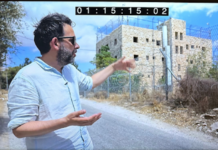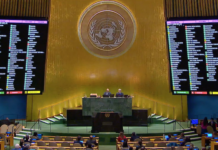By ,
So many Palestinians have died in the attacks on Gaza in the past fortnight – and people in Israel too from fire going the other way – it seems churlish to highlight the plight of the media.
But the Israelis taking down the HQ of major media outlets in Gaza last weekend was extraordinary.
The owner of the Jalaa Tower housing international media said an Israeli intelligence officer warned him by phone that he had just one hour to ensure that the building was evacuated. His plea for “10 extra minutes”, broadcast live by Al Jazeera, was denied.
AP’s footage of their staff bugging out of the building in a hurry was chilling too – before the destruction of the tower by jets, also covered live on TV:
LIVE footage of the moment an Israeli air raid bombed Jalaa Tower housing the offices of Al Jazeera and The Associated Press in Gaza City. pic.twitter.com/NDulJYte6V
— Fuata Nyuki (@ArapKungu) May 15, 2021
It’s extraordinary but not unprecedented.
During the Sarajevo siege in 1992, hotels housing international journalists were targeted – but so was much of the central city at the time.
In November 2001, the Kabul office of Al Jazeera was destroyed by a missile fired by a US warplane. Al Jazeera’s Baghdad office was hit by a missile fired by a US jet in 2003, killing one reporter and wounding another person.
The US copped a lot of flak for that – and it hasn’t been forgotten. Israel seems more than willing to cop the criticism.
The US news agency Associated Press was also headquartered in the same tower, and also the London-based online outlet Middle East Eye .
To enable them to continue working, Agence France-Presse has opened its Gaza office to AP and Al Jazeera.
The New York-based Committee to Protect Journalists demanded from the Israeli government a “detailed and documented justification for this military attack”.
“This latest attack on a building long known by Israel to house international media raises the spectre that the Israel Defence Forces is deliberately targeting media facilities in order to disrupt coverage of the human suffering in Gaza,” said CPJ executive director Joel Simon.
“Journalists have an obligation and duty to cover unfolding events in Gaza and it would be illegal for the IDF to use military means to prevent it.”
Gaza spills over into coverage of sport
When Leicester City won the English FA cup final on Sunday, two players posed with a Palestinian flag. The TV pictures were only fleeting but — the images went round the world on social media:
Wow! this from the Palestinian Ambassador on behalf of the Palestinian government and people thanking Hamza Choudhury & Wesley Fofana of Leicester City Football Club for using the historic FA Cup triumph to show solidarity. “No one is free until Palestine is free” #FreePalestine pic.twitter.com/eHPIY2I8gG
— Claudia Webbe MP (@ClaudiaWebbe) May 16, 2021
Meanwhile in Melbourne, Wellington Phoenix’s Israeli striker Tomer Hemed was cautioned by the referee for putting out a kippah as part of a goal celebration — and he charged into the arms of fans with Israeli flags after scoring a penalty. That certainly got noticed in Australia too.
When the Phoenix came home on Monday, media wanted to talk to Hemed — but had to make do with putting awkward questions to general manager David Dome instead at the airport.
He said Hemed’s celebrations were “a plea for peace.”
NZME sports writer Michael Burgess said Tomer Hemed is “not playing for Israel at the moment – he’s playing for the Phoenix – and needed to be more respectful of his club and the optics around that and has put them in an awkward situation”.
“Hemed also needs to be respectful towards Australia and New Zealand, where the majority of people probably have a vastly different view to his own about the current conflict, especially the Israeli concept of ‘defending’ their nation with strikes that cause untold collateral damage, including sleeping children in their beds,” he added.
Football authorities take a take a dim view of political posturing on the pitch. But Black Lives Matter has changed the game and emboldened players now they know they have the power.
It also puts the broadcasters in an awkward position.
Sports authorities will want them to treat players making personal/political/nationalistic statements like streaking or fan violence – and turn the cameras away.
But is that a form of censorship?
Some networks suffered blowback in the US for showing sports people taking a knee in support of BLM – but showed the scenes anyway. And what if the cameras never showed the 1968 Olympic Black Power protest salute?
This article is republished under a community partnership agreement with RNZ.













































